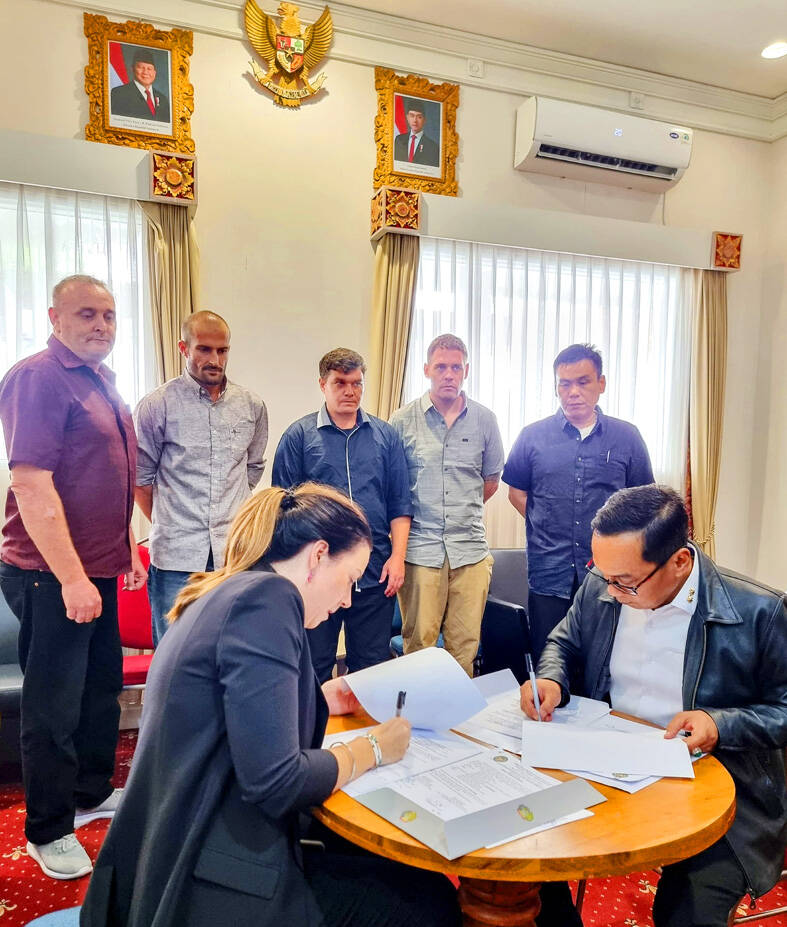The five remaining members of the Australian “Bali Nine” drug ring yesterday flew home after 19 years in jail in Indonesia, ending a saga that had frayed relations between the countries.
Indonesian police arrested the nine Australians in 2005, convicting them of attempting to smuggle more than 8kg of heroin off the holiday island of Bali.
The case drew global attention to Indonesia’s unforgiving drug laws, with two members of the gang executed by firing squad, while the others served hefty prison sentences.

Photo: EPA-EFE / Indonesian Ministry of Law and Human Rights
“The Australian Government can confirm that Australian citizens, Matthew Norman, Scott Rush, Martin Stephens, Si Yi Chen and Michael Czugaj have returned to Australia,” Canberra said in a statement. “The men will have the opportunity to continue their personal rehabilitation and reintegration in Australia.”
Australian Prime Minister Anthony Albanese said the men returned in the afternoon, adding that he had thanked Indonesian President Prabowo Subianto for his “compassion.”
“Australia shares Indonesia’s concern about the serious problem illicit drugs represents,” Albanese said.
“The government will continue to cooperate with Indonesia to counter narcotics trafficking and transnational crime,” he told reporters. “These Australians spent more than 19 years in prison in Indonesia. It was time for them to come home.”
The Australian government did not give further details on the agreement with Jakarta.
An Indonesian lawmaker said the five men had left the country as prisoners, but “all the responsibilities for them” had now passed to Australia.
The men were accompanied on their flight home by three officials from the Australian embassy, another Indonesian official said.
Negotiations over the repatriation of the men reportedly picked up after Prabowo met Albanese on the sidelines of the APEC summit in Peru last month.
The Australian government said it had consistently advocated for them and provided consular support to them and their families during their incarceration.
It asked the media to respect their privacy.
The Australian Broadcasting Corp said the men were now free, and would not have to serve further prison time at home.
Accused “Bali Nine” ringleaders Andrew Chan and Myuran Sukumaran were executed by firing squad in 2015 despite repeated pleas from the Australian government, which recalled its ambassador at the time.
Tan Duc Thanh Nguyen died of cancer in 2018, months before Renae Lawrence was released after her sentence was commuted.

WAITING GAME: The US has so far only offered a ‘best rate tariff,’ which officials assume is about 15 percent, the same as Japan, a person familiar with the matter said Taiwan and the US have completed “technical consultations” regarding tariffs and a finalized rate is expected to be released soon, Executive Yuan spokeswoman Michelle Lee (李慧芝) told a news conference yesterday, as a 90-day pause on US President Donald Trump’s “reciprocal” tariffs is set to expire today. The two countries have reached a “certain degree of consensus” on issues such as tariffs, nontariff trade barriers, trade facilitation, supply chain resilience and economic security, Lee said. They also discussed opportunities for cooperation, investment and procurement, she said. A joint statement is still being negotiated and would be released once the US government has made

NEW GEAR: On top of the new Tien Kung IV air defense missiles, the military is expected to place orders for a new combat vehicle next year for delivery in 2028 Mass production of Tien Kung IV (Sky Bow IV) missiles is expected to start next year, with plans to order 122 pods, the Ministry of National Defense’s (MND) latest list of regulated military material showed. The document said that the armed forces would obtain 46 pods of the air defense missiles next year and 76 pods the year after that. The Tien Kung IV is designed to intercept cruise missiles and ballistic missiles to an altitude of 70km, compared with the 60km maximum altitude achieved by the Missile Segment Enhancement variant of PAC-3 systems. A defense source said yesterday that the number of

‘CRUDE’: The potential countermeasure is in response to South Africa renaming Taiwan’s representative offices and the insistence that it move out of Pretoria Taiwan is considering banning exports of semiconductors to South Africa after the latter unilaterally downgraded and changed the names of Taiwan’s two representative offices, the Ministry of Foreign Affairs (MOFA) said yesterday. On Monday last week, the South African Department of International Relations and Cooperation unilaterally released a statement saying that, as of April 1, the Taipei Liaison Offices in Pretoria and Cape Town had been renamed the “Taipei Commercial Office in Johannesburg” and the “Taipei Commercial Office in Cape Town.” Citing UN General Assembly Resolution 2758, it said that South Africa “recognizes the People’s Republic of China (PRC) as the sole

Taiwanese exports to the US are to be subject to a 20 percent tariff starting on Thursday next week, according to an executive order signed by US President Donald Trump yesterday. The 20 percent levy was the same as the tariffs imposed on Vietnam, Sri Lanka and Bangladesh by Trump. It was higher than the tariffs imposed on Japan, South Korea and the EU (15 percent), as well as those on the Philippines (19 percent). A Taiwan official with knowledge of the matter said it is a "phased" tariff rate, and negotiations would continue. "Once negotiations conclude, Taiwan will obtain a better